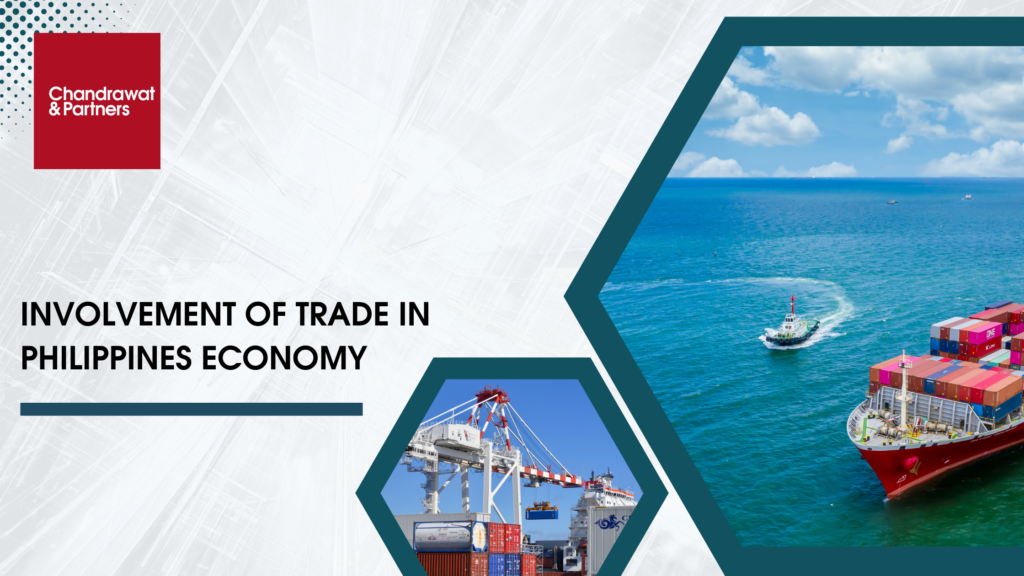
May 28 , 2024
INVOLVEMENT OF TRADE IN PHILIPPINES ECONOMY
INVOLVEMENT OF TRADE IN PHILIPPINES ECONOMY
Trade is the voluntary exchange of goods and services between two or more parties. Trade in Philippines is carried out through two major routes – Domestic route and International route. Domestic trade is the trade within a country’s borders, between businesses and consumers in the same country. International trade involves the exchange of goods and services between different countries. It fosters economic growth by creating jobs and promoting competition. Trade can also lead to cultural exchange and understanding between different countries. Philippines is a country that is heavily dependent on foreign trade. Its substantial volume of imports and exports makes commerce paramount for its economic expansion.
IMPACT OF EXPORT IN THE PHILIPPINES ECONOMY
In the context of trade, an export refers to a good, service, or commodity that is produced in one country and then sold and sent to a different country. Exports are a key component of international trade, and nations rely on them to generate revenue and participate in the global marketplace. For many nations, exports are the main factor driving economic growth.It enables countries to reach out to the markets outside of their own, which could result in higher output, creation of jobs, and earnings in foreign currencies. Exporting typically entails a number of procedures, including locating overseas consumers, drafting contracts and adhering to customs.
In the electronics sector, Philippines is a major player, particularly in integrated circuits and semiconductors. The US, China, Hong Kong, Japan, and Singapore are the top destinations for Philippines exports. These countries benefit from the high-quality electronics and other goods produced in Philippines.
IMPACT OF IMPORT IN THE PHILIPPINES ECONOMY
A good, service, or commodity that is carried into any nation from another for usage, sale, or processing is known as an import in the commerce sector. Sometimes, consumers can find less expensive substitutes for domestically manufactured items from imports, which can increase competition and possibly drive down overall prices. Essential items such as mineral fuels (oil used for energy), electrical machinery (including electronics for manufacturing), and diverse industrial machinery are imported into Philippines. Iron and steel, as well as vehicles, are significant import products for the economy of Philippines. China is Philippines biggest import partner, followed by other Asian countries like Indonesia, South Korea, and Japan.
TRADE BALANCE IN ECONOMY
In international trade, the trade balance refers to the difference between a country’s total exports and its total imports over a specific period. It is used to assess a country’s trading activity and its position in the global market. Trade surplus is favorable as it helps a country in generating more foreign currency from exports than it spends on imports. The trade deficit is not necessarily negative as it indicates strong domestic demand for foreign goods or a powerful currency. The trade balance is a useful indicator of a country’s competitiveness in the global market. It can also influence foreign exchange rates and impact a country’s overall economic well-being.
Philippines has a trade deficit, however, there have been positive developments in recent years. Philippines imports machinery, electronics components needed for manufacturing and fuel, which are crucial for its economy. Filipinos have a growing domestic demand for various goods, and imports help meet that demand.
BOOSTING TRADE
Philippines is a participant in both the Asia-Pacific Economic Cooperation (“APEC”) and the Association of Southeast Asian Nations (“ASEAN”). By providing favorable tariffs, or reduced import taxes, and other advantages to Philippine exports, these memberships encourage commerce and investment within the area and increase Philippine exports’ competitiveness. The Department of Trade and Industry (DTI) plays a key role in shaping trade policies. They help businesses export more easily and work to attract foreign investment, which can bring new technologies and jobs to the Philippines.
GROWTH OF TRADE
The Philippines trade sector is ready for growth and potential transformation in the coming years. The Philippines government is actively working on programs to boost exports. This includes measures to enhance the competitiveness of existing export industries like electronics and develop new export sectors. Government takes initiatives to attract foreign investment and improve trade facilitation by streamlining customs procedures and reduce trade barriers. Also, the Philippines’ membership in ASEAN and APEC provides preferential tariffs and other benefits for its exports. And RCEP (Regional Comprehensive Economic Partnership), recent implementation creates a massive free trade zone in Asia, offering Philippines wider market access and potentially boosting trade activity.
MOVING AHEAD
The Philippines will move beyond electronics and explore diversification into other sectors like processed food, pharmaceuticals, and IT-enabled services, the Philippines’ growing e-commerce sector is expected to play a larger role in trade, facilitating both exports and imports. There’s a growing global emphasis on sustainable practices. The Philippines can position itself as a producer of eco-friendly products and attract environmental conscious buyers.
Overall, the Philippine trade sector has promising prospects for growth and development. By addressing challenges and capitalizing on opportunities, the Philippines can establish itself as a more prominent player in the global trade arena.
HOW WE CAN HELP?
Our team can play significant role in international trade in a number of ways, depending on the area of focus in following ways:
- Our panel of experts can work with businesses to help clients in understanding the complexities of international trade. This could involve providing advice on customs regulations, trade agreements, and export controls. We can also help businesses connect with potential trading partners in other countries.
- We can advise on international trade rules and regulations and ensure that businesses comply with relevant trade agreements, import/export rules, and sanctions.
- Our professionals can help in drafting and vetting international contracts and also help the clients in making contracts that protect their interests and comply to the rules.
For more information or queries, please email us at
enquiries@chandrawatpartners.com
Key Contact

Surendra Singh Chandrawat
Managing Partner

